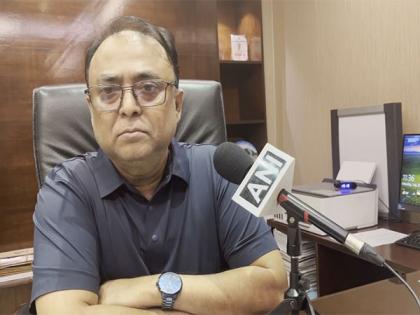"More than 25 patients are very critical": Dr Mohammad Nasir Uddin on condition of victims in Dhaka jet crash
By ANI | Updated: July 22, 2025 02:39 IST2025-07-22T02:33:38+5:302025-07-22T02:39:26+5:30
Dhaka [Bangladesh], July 22 : Following the Bangladesh Air Force jet crash into a school in Dhaka, Dr Mohammad ...

"More than 25 patients are very critical": Dr Mohammad Nasir Uddin on condition of victims in Dhaka jet crash
Dhaka [Bangladesh], July 22 : Following the Bangladesh Air Force jet crash into a school in Dhaka, Dr Mohammad Nasir Uddin, Director of the National Institute of Burn and Plastic Surgery, shared a detailed update on the condition of the victims and the hospital's ongoing response efforts.
"After the plane crash, most of the patients actually came directly to the institution. Also, some of the other hospitals took some of the patients, but most of the patients actually came here and started arriving just half an hour after the incident," Dr Uddin stated.
He confirmed that the hospital initially received 21 patients, but that number has since risen. "So far, we primarily received 21 patients, but at present, we have 44 patients admitted in different units of our hospital. Some patients have been transferred to Dhaka Medical College and one also to CMAs. Actually, the CMAs patients were taken on their own accord because they have some connection with the CMAs, but all other patients are admitted here."
Explaining the treatment arrangements, Dr Uddin said, "Some of them are in the ICU, some of them are in the HDU, and some of them are in our special unit. That is, the post-op ward has been turned into a special unit for this one patient."
While Dr Uddin could not confirm patient details at other hospitals, he noted, "It will be confirmed by our ministry, but what I can tell you is the number of patients admitted in our hospital and how many patients are receiving treatment at present."
On the severity of the cases, he said, "More than 25 patients are actually very critical, and you know, burn is a dynamic process. The patient assessment is done repeatedly, reassessment and reassessment are done repeatedly. Our measurement is also done. At present, 25 patients are very critical, and they are being treated in the ICU and HDU."
Addressing the large number of burn cases, Dr Uddin added, "As physicians, we do not want any patient to be burned, because you know, the treatment process for burns is quite serious. Patients who survive burns have to undergo long-term treatment. So, this portion is quite out of our hands, how many people will be burned."
Regarding concerns about blood shortages, he clarified, "No, actually, in burn patients, on day one, we usually do not give any blood. From after 24 hours, most of the time we actually give fresh plasma, not direct blood. So, at present, we do not have any scarcity of blood at all."
Dr Uddin also addressed the influx of volunteers and blood donors. "We have already asked people not to come here to donate blood. We will try to tell them, we will inform them, if we have any scarcity of blood. Individual persons are coming here, and you know, a lot of other people are taking advantage of this, and there are some people who are doing some sort of scam."
He continued, "We ask them, please, don't try to come in a group. If you want to donate blood, you should just put your number in our information list, and if necessary, we will call you."
Assuring the public of the hospital's capacity, he said, "So far, our institution is quite properly equipped. The first 24 hours is very important, very crucial. Transferring a burn patient is not that easy. But so far, our institution has the capacity to treat them. However, there are some patients for whom, in any part of the world, if the burn is severe, it's really difficult to treat them."
Touching on public response and volunteer crowding, he remarked, "This is an emotional matter. The victims are mostly students. So, we cannot ignore the emotions of the common people. But sometimes, this emotion might cause some sort of problem with the management process. We respect their emotion, but we ask them not to crowd here. That might cause cross-infection and might actually endanger their lives."
Dr Uddin confirmed that the hospital is fully staffed and stocked: "In our institution, we have all the facilities, all the nurses, doctors, and they are quite capable. The equipment and other medicine are also stored here. Our ministry and other government agencies are actually helping us. At present, we do not need any help from the outside."
To the families of the victims, he shared a heartfelt message: "Our sympathy is with them, and we will try our best to serve every patient. But at the same time, we have to say, please don't come here in a group. I know you are very emotional at this moment. Your children are our children, and we will treat them without any hesitation."
He added, "We have all the patients' contact numbers. If necessary, we can call them. So, if possible, they should not be around the patient areas, such as the ASDU or ICU, because their presence might cause some problems. That's why we ask them to stay a bit away from the hospital premises. If needed, we will contact them, and we will do whatever is needed."
Disclaimer: This post has been auto-published from an agency feed without any modifications to the text and has not been reviewed by an editor
Open in app